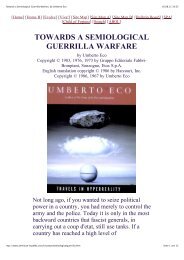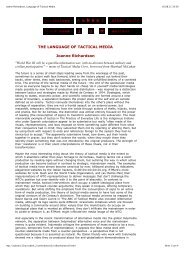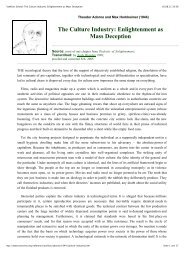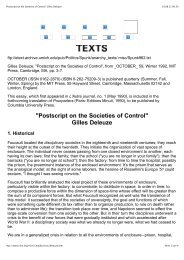The Precession of Simulacra.pdf - kareneliot.de
The Precession of Simulacra.pdf - kareneliot.de
The Precession of Simulacra.pdf - kareneliot.de
Create successful ePaper yourself
Turn your PDF publications into a flip-book with our unique Google optimized e-Paper software.
Jean Baudrillard - Simulations (English Translation)16.08.11 20:28<strong>The</strong> question/answer cycle finds extension in all domains. You slowly find that the entire realm <strong>of</strong>inquiries, polls, and statistics needs to be looked at again in relation to this radical suspicion which fallsupon their methods. But the selfsame suspicion falls on ethnology. Unless you admit that the natives areperfect naturals, incapable <strong>of</strong> simulation, the problem is the same as here: the impossibility <strong>of</strong> obtainingfor a directed question any answer other than simulated (other than reproducing the question). It isn'teven certain that you can interrogate plants, animals, nor even inert matter in the exact sciences with anychance <strong>of</strong> "objective" response. As to the response <strong>of</strong> the polled to the poll-takers, the natives to theethnologist, the analyzed to the analyst, you can be sure that the circularity is total: the ones questionedalways pretend to be as the question imagines and solicits them to be. Even psychoanalytic transferenceand counter-transference fall today un<strong>de</strong>r the sway <strong>of</strong> this stimulated, simulated-anticipated response,which is none other than the very mo<strong>de</strong>l <strong>of</strong> the self-fulfilling prophecy. 5 We come then upon a strangeparadox: the word <strong>of</strong> the polled, the analyzed, the natives, is irremediably short-circuited and lost, and itis on the basis <strong>of</strong> this foreclosure that these respective disciplines - ethnology, psychoanalysis, sociology -are going to be able to experience such marvelous growth. But they become puffed-up on mere wind, forit is in that respect that the circular response <strong>of</strong> the polled, the analyzed, the natives is all the same achallenge and a triumphant revenge. It is that they place the spotlight back on the question itself, isolateit in <strong>of</strong>fering it the mirror <strong>of</strong> the answer it was awaiting, and show it helpless to ever quit the viciouscircle which in fact is that <strong>of</strong> power. Just as in the electoral system, in which the representatives nolonger represent anything because they control so well the responses <strong>of</strong> the electoral body. Buteverything has, somehow, elu<strong>de</strong>d the ruling class' grasp. This is why the dominated answer <strong>of</strong> the nativesis all the same a real response, a <strong>de</strong>sperate vengeance: that <strong>of</strong> letting power bury power.<strong>The</strong> "advanced <strong>de</strong>mocratic" systems are stabilized on the formula <strong>of</strong> bipartite alternation. <strong>The</strong> monopolyin fact remains that <strong>of</strong> a homogenous political class, from left to right, but it must not be exercised assuch. <strong>The</strong> one-party totalitarian regime is an unstable form - it <strong>de</strong>fuses the political scene, it no longerassures the feed-back <strong>of</strong> public opinion, the minimal flux in the integrated circuit which constitutes thetransistorized political machine. Alternation, on the other hand, is the end <strong>of</strong> the end <strong>of</strong> representation, sosolicitation is maximal, by dint <strong>of</strong> simple formal constraint, when you are approaching most nearly aperfect competitive equation between the two parties. This is logical. Democracy realizes the law <strong>of</strong>equivalence in the political or<strong>de</strong>r. This law is accomplished in the back-and-forth movement <strong>of</strong> the twoterms which reactivates their equivalence but allows, by the minute difference, a public consensus to beformed and the cycle <strong>of</strong> representation to be dosed. Operational theatre, where the only play stagedanymore is the fulginous reflection <strong>of</strong> political Reason. <strong>The</strong> "free choice <strong>of</strong> individuals, which is thecredo <strong>of</strong> <strong>de</strong>mocracy, leads in fact precisely to the opposite: the vote becomes functionally obligatory: if itis not legally, it is by statistical constraint, the structure <strong>of</strong> alternation, reinforced by the polls. 6 <strong>The</strong> votebecomes functionally aleatory: when <strong>de</strong>mocracy attains an advanced formal stage, it distributes itselfaround equal quotients (50/50). <strong>The</strong> vote comes to resemble a Brownian movement <strong>of</strong> particles or thecalculation <strong>of</strong> probabilities. It is as if everyone voted by chance, or monkeys voted.At this point it makes no difference at all what the parties in power are expressing historically andsocially. It is necessary even that they represent nothing; the fascination <strong>of</strong> the game, the polls, theformal and statistical compulsion <strong>of</strong> the game is all the greater."Classical" universal suffrage already implies a certain neutralization <strong>of</strong> the political field, if only by theconsensus on the rules <strong>of</strong> the game. But you can still distinguish therein the representatives from therepresented, an the basis <strong>of</strong> a real social antagonism <strong>of</strong> opinion. It is the neutralization <strong>of</strong> thiscontradictory referent, un<strong>de</strong>r the sign <strong>of</strong> a public opinion from now on equal unto itself, mediated andhomogenized by anticipation (the polls) that will make alternation possible "at the top": simulation <strong>of</strong>opposition between two parties, absorption <strong>of</strong> their respective objectives, reversibility <strong>of</strong> the entirediscourse one into the other. It is, beyond the representing and the represented, the pure form <strong>of</strong>http://www.ee.sun.ac.za/~hgibson/docs/html/<strong>Simulacra</strong>-and-Simulation.html#c2Seite 37 von 45






